Conspiracy Read online
Page 4
‘I see. So the idea is to attack the empire from within as well as engaging it in pitched battles.’
‘Precisely. If we can achieve something in the French capital, something truly spectacular that might confound Napoleon and make other potential rebels think seriously about an insurrection, then we will have succeeded. Also, and this is what the peer is concerned about, it’s a chance to upstage Cavanagh’s plan with the French army completely. Cavanagh’s faction will look foolish. It is wholly his plan, not the prince’s, and as soon as ours works the prince will claim it as his own, you mark my words.’
Keane began to see now and realized that their intention was well grounded. Quite apart from that, he knew that he had a duty to Wellington, and the commander in chief’s talk of promotion had also not gone unnoticed. ‘When do we start?’
‘As soon as you can. I don’t think you’ll get anything more from Colonel Hulot. He’s played his part, and he’s decided to remain with us, with his wife. We think he might go down rather well in London.’
‘Just as I might “go down” in Paris, do you think?’
‘This is no time for joking, James. Besides, in his case, there will be no deception involved. Have you any idea who you’ll take with you?’
‘I had them in my mind as soon as you told me, sir. Archer and Silver.’
‘Yes, of course, the grave robber and the housebreaker.’
Keane smiled. ‘The doctor, sir. You will recall that Archer was a trainee doctor when he was caught.’
‘As I said. Caught robbing graves, doctor or not. Nevertheless, a good choice. The doctor, as you call him, could quite easily pass as an officer and Silver might make a good servant for you both.’ Grant placed an avuncular hand on Keane’s shoulder. ‘James, do take care, won’t you? We should hate something to happen to you before you’ve even got to Paris.’
‘I’ll keep your advice in mind, sir. I’m sure that all will be fine.’
But as he turned and left the hall, Keane knew that he was lying. As hare-brained schemes went, this was surely one of the very best.
3
Keane had become used to surprises while serving as an exploring officer, but it had taken some time for the reality of the task to become clear to him. Now, four days after his meeting with Wellington and as he began to prepare to depart, he went over it again in his mind. Using Colonel Hulot’s information Wellington and Grant had come up with a plan to end all plans. They intended to send Keane to Paris, right into the heart of Bonaparte’s Imperial machine. Initially he would report back with intelligence about the emperor and his troops’ movements. But what was really expected of him was to galvanize what appeared from the reports of Wellington’s agents to be a growing movement against the empire. What they asked for and what they wanted were in fact different things. What they really wanted was an uprising, or a coup. Something that would strike a note for freedom. What they needed, Keane knew, was to impress the Prince Regent and to outwit his political and military henchmen. This was high-level internal politics played out on the international stage and Keane had just become, for the moment, the principal player. It was a daunting task and he dearly hoped that he might be its equal.
Since 1809 Keane had been learning his job the hard way. Trial and error were his only means and he had to rely solely on his wits and the talents of his men. No one had written the manual of how to be a good intelligence officer. All he knew was that he had to get information and get it while it was still of value.
*
He sat on a wooden biscuit box in his tent in the British lines on the north side of the city, in the shadow of the fort of San Cristobal, now Wellington’s headquarters, and attempted to sew up a hole that had been torn in his tunic three nights before, during the fracas with the redcoats. The place still had the stench of death over it and no amount of gin or brandy seemed to be able to wash it away from his nostrils. It was always the way after a battle, but here at Badajoz, where so many had died in such a small, enclosed space, the stench seemed especially powerful. Keane cursed.
He was making a pig’s ear of the sewing and he knew it. He turned to Garland. ‘You any good at this sort of thing?’
The big man shook his head and showed Keane his huge, ham-like hands before laughing.
Keane tried again. ‘Will?’
‘I’m afraid I’ve never been very good with a needle and thread. My ma used to do it all, else give it to one of the maids.’
Silver piped up. ‘Oh, here we go. Hark at Mister Martin. “One of the maids”.’
Keane was well aware of Martin’s origins. He had been compelled to enlist in the army after having had his way with one of the farm-maids and producing an unwanted heir. They all knew about it, but as far as Keane was concerned, in his unit, the past was not somewhere that was often visited. He preferred his men to focus on the present. Any regrets, any mistakes, and they all had enough of those, were best forgotten. It was an unwritten law.
He snapped, ‘That’s enough, Silver. We’ve all seen better days in some way. What about you . . . ow!’
He cursed himself for sticking the needle into his thumb. ‘Damn, you wouldn’t think a thumb could have such a quantity of blood in it.’
Silver spoke. ‘I’m no good with a needle, sir, but you might try Gabriella.’
It was all the cue Keane had been waiting for. He held out his torn coat to Silver. ‘Would you oblige me? There’s a good fellow.’
Silver knew when he had been caught. Taking the coat he walked to find his wife. The two had been married under common law for three years, ever since Keane had rescued him from jail and Gabriella from the life of a prostitute in Lisbon. They doted on one another and she had followed him bravely through three years of campaigning in all weathers and against all perils.
Keane turned back to Archer. ‘You see. I waited my time and exploited the opportunity when it came. Let that be a lesson to you in tactics.’
Archer laughed. ‘Yes, sir. You played it well. And you’ve only a minor casualty.’
‘Worth it for the fine job Gabriella will do on my coat. I need to speak to you. In confidence.’
‘Sir?’
‘I have orders from Major Grant.’
‘A new assignment, sir?’
‘A new assignment, and to be honest with you I’m more than a little unhappy. It will mean splitting up the company.’
‘Destroying the unit, sir? Surely not.’
‘Not destroying it, Archer, but that is surely what will happen should we not return.’
‘We, sir?’
‘You and Silver and me.’
Archer said nothing. Keane continued, ‘Of course I have to accept it. It’s an order. But it doesn’t go easy.’
For a few minutes both men were silent. He poked at the earth at his feet with a stick, creating pictures in the dust. A map of Spain with France beyond it and, along the line of a long road, the circle of Paris. He had agreed to obey the orders. Of course he had; Keane was a soldier, body and soul. Trained to obey orders and to do his duty. He lived by the code of honour of an officer, and while he might protest, there was nothing he could do that would persuade him to disobey a superior when given a direct order. Certainly in the past and he presumed in the present, he had managed to interpret certain orders creatively and to bend the rules. But this was clear-cut.
Yet in his heart he was torn between duty and instinct. While his head told him to obey, his heart said that he should not leave his men. They were a close-knit team. He had made them what they were, and to leave them and travel thousands of miles into France was in his mind to betray them, to leave them leaderless. He would have to have some assurance from Grant at least if not the peer that should he not return the men would be treated well and honoured for everything they had done under his command. It would be all too easy for them to be dispersed and forgotten.
And that he could not allow to happen.
But he had another duty apart from that to his men. Wellington had done something extraordinary in the last three years. He had taken an army lacking in direction and of questionable morale and made it his own. And with that army he had beaten a French force more than five times its size. He had done so through brilliant strategy and tactics in the field and through the use of some extraordinary initiatives. He had compelled the people of Portugal to burn their own fields and abandon their villages and towns to the invader, and in doing so he had denied the enemy any source of supply. He had created his own logistical services and not least Keane’s own service, the Corps of Guides with its role as the eyes and ears of the army. The army, like the whole of the Peninsula, owed much to Wellington, as did Keane himself. He had been plucked from his role as an infantry officer in a line regiment and given powers beyond his dreams. Of course at the same time, and much to his regret, he had left behind the life of that officer and the front-line action which it involved. But ultimately he had a duty to Wellington and it was this he knew which would prevail.
At last Archer could wait no longer. ‘What is it, sir? Can you not tell us now?’
Keane looked up. ‘Oh, it’s a really good one this time. For your ears only, Archer, for the present at least. The peer wants us – the three of us – to get ourselves taken prisoner and then to escape our captors and somehow get into Paris. And once we’re there he wants us to start a revolution. What do you think to that?’
Archer shook his head, but he was smiling. ‘I think it’s quite mad. Of course, sir. But it’s no more mad than many of the things we’ve managed before, sir.’
Keane wasn’t sure yet himself what he thought of their plan. He trusted Grant implicitly. He often thought that the man had become like a father to him. But did he, he asked himself, really believe that between them he and Archer could incite a rebellion that might help to topple the regime of the most powerful man in the world? And who were these shadowy figures, described by Colonel Hulot? He had only one name as yet. Grant had mentioned a man to him in Paris, Macpherson, and had promised him details of where he might be found.
He wondered about Hulot himself. Might he not, Keane wondered, just as easily be a Bonapartist agent, planted in Badajoz to infiltrate their own organization? Grant had hinted that even having checked the man’s connections with the exiled Bourbons, he was not entirely sure of the colonel. Keane was sure that Grant would not make an error over such a thing, but such was the confusion now in this game of intelligence that he could no longer be totally certain.
The thought worried him and he wondered if there might be a way to establish Hulot’s credibility. That was it. That was the answer, surely. If he were somehow to prove that Hulot was in fact a Bonapartist spy, then the colonel’s information would be utterly discredited and the mission would have to be aborted. It was a long shot, but it was all that he had.
*
Archer spoke, interrupting his thoughts. ‘Sir, don’t you agree? We’ve always managed it before. All we have to do is believe we can do it. We can bluff our way through anything. Well, you can. I’d believe anything you told me, sir, and the Frenchies will too. You can lie with the best of them.’
Keane smiled at him. ‘I’m not quite sure how I should take that, Archer, but I’ll suppose it was a compliment.’
But what Archer had said made him think again, and it suddenly occurred to him that perhaps there was one simple way to ascertain whether Colonel Hulot was indeed, as the commander in chief was fond of saying, ‘the genuine article’. Philipon had been only too ready to point the man out. It had all somehow been too easy. He decided that more proof were needed. It would be desperate, immoral even, but he had to be sure that his hunch was wrong.
*
Waiting until Gabriella had finished mending his tunic with her expert touch, Keane retrieved it and, slipping it on over his shirt, began to walk quickly from their bivouac, unseen by his men, and on up the hill towards the fort. Through the gate he entered the courtyard and walked across the cobbles to Wellington’s headquarters building. The red-coated sentry from the 1st Guards, recognizing him from the previous day, saluted and made way. But Keane stopped short of the doorway. Instead he turned to the right and headed towards the living quarters where the French prisoners of rank were being held.
He had recalled Grant telling him that Colonel Hulot was to be taken that afternoon some miles to Elvas, to give some particular information about codes to George Scovell, and, knowing Scovell’s propensity for exactitude, was playing a hunch that the Frenchman would not yet have been returned. Keane crossed an inner courtyard and came to the gate of the prisoners’ quarters. The guard here too saluted and allowed him to pass. The prisoners had been placed in the city guard’s rooms, which were around a yard in the centre of which stood a large ornamental fountain topped with a statue of a knight. He recognized two of the servant women from three nights before standing at the fountain using the water to scrub at some laundry. They looked up and one of them seemed to acknowledge him and turned to her companion, who gave him a smile. Keane went up to them and asked in French directions to Colonel Hulot’s quarters. The smiling woman pointed towards the far wall, where a door lay open beneath a balcony. Thanking her, Keane walked across and knocked at the open door. A voice from within, a woman’s voice, called, ‘Come in.’
Madame Hulot was sitting in a chair looking out of the window down onto the land below and the road along which her husband was soon to return. She turned as Keane entered and rose from the chair, gathering about her the tapestry on which she had been at work and laying it on the circular table that stood in the centre of the room. She seemed surprised to see him.
‘Captain . . . I’m sorry, I don’t have your name.’
‘Keane, madame, James Keane.’
‘Captain Keane, how nice to see you. You were so kind to me, to all of us. My husband is eternally grateful.’
‘Thank you, madame. It’s about your husband that I have come to see you.’
‘Really, about Colonel Hulot? On what account?’
‘I’m very much afraid that I have some bad news.’
He turned and gently closed the door of the room. Turning back, he saw that she had sat down and was staring at him, ashen-faced. ‘You have bad news, about my husband?’
‘I’m afraid so. It would appear that there was an accident as he and his escort were returning from Elvas. A snake frightened the colonel’s horse. He was thrown. It is most unfortunate.’
‘He is hurt? Badly?’
‘Worse than that, I’m afraid, madame. Your husband is dead.’
Madame Hulon stared at him for a moment in disbelief and then looked away. Then, very quietly, she began to sob. Keane walked across and placed a hand on her shoulder. ‘I’m so, so very sorry.’
She looked up at him, the tears coursing down her face. ‘Did he die at once?’
‘Instantly, I believe. He landed on his head. Hit it on a rock. He would have known nothing.’
‘Why Jacques? Why now? Just when we thought we had managed to escape. To make a new life. A life with some hope. Why?’
‘Yes, it is tragic. I am so sorry.’
‘After all that he has been through. The war. So many battles. So many wounds. To end like this. Falling from his horse.’
‘If it is any consolation, the information he has given us will be most useful in the war.’ He chose his words with care to study her reaction. Thus far she had appeared to be genuine in her shock and grief.
‘Oh, damn the war. What does it matter? He’s dead.’
Keane said nothing. Madame Hulot continued to sob, her head bent. Quiet sobs that cut him to the soul. He had known grief, of course. When Morris had been killed and when he had lost the love of his life. But to see such grief moved Keane as little had before. He knew of course that it was
needless, that Hulot was of course not dead at all, and that made it all the worse. That he was the source of this extraordinary sadness. But he knew that the need for reliable information was paramount. He was still not satisfied that Hulot was indeed on their side. He tried again.
‘Madame, I am truly sorry. I was only trying to bring some sort of hope in the face of such tragedy.’
She turned and looked him in the eyes. ‘Hope? What hope have I now? You disgust me, all of you. You Englishmen, with your lack of emotion. Your bravery, your talk of winning. Can’t you see, no one wins a war? Everyone loses. It doesn’t matter whose side you are on. They’re all the same.’
Keane smiled at her. ‘Well, that is just what we were afraid of.’
‘What? What do you mean?’
‘We know the truth, madame. We know that the colonel was no more a royalist than you are, or Bonaparte himself. We know that you are both Bonapartists and that he was placed here in order to trick us and that the information he passed to us was false. What intrigues me is how you could think we would be deceived? The so-called information was known to us weeks ago and was proved quite false then by our own intelligence agents. How very, very stupid of you both. But I suppose he was only following orders. The poor fool. Perhaps it’s just as well for him that he’s dead. That’s how he would have ended up. At the end of a rope.’
Madame Hulot looked at him for a few minutes with incredulity in her eyes. Then she spoke. ‘Have you finished? I hope that you have, captain. For I do not wish to hear any more. I have never met anyone so utterly heartless. So very cruel. I had misjudged you. I thought you a friend. I thought you had come to tell me about Jacques because you had pity in your heart. But now I see that you do not even have a heart. You are so right, aren’t you? So very correct. So sure of yourself. How wrong you are, how very, very wrong. Jacques was the most decent human being you will ever meet. Truthful, honest and with a deep love for life. I don’t care what you do to me. Hang me if you like, as a spy. I have no life now. He was my life and I his. Now that is gone.’

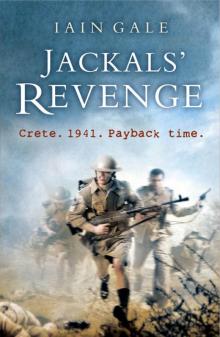 Jackals' Revenge
Jackals' Revenge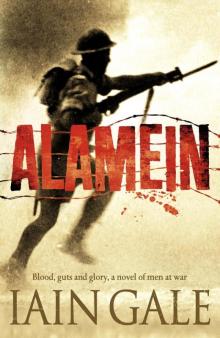 Alamein
Alamein Conspiracy
Conspiracy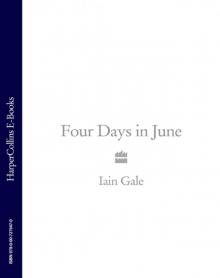 Four Days in June
Four Days in June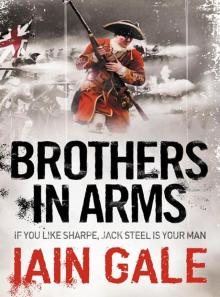 Brothers in Arms (Jack Steel 3)
Brothers in Arms (Jack Steel 3) Brothers in Arms
Brothers in Arms 02 - Keane's Challenge
02 - Keane's Challenge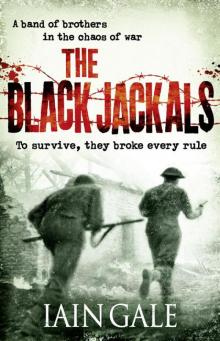 The Black Jackals
The Black Jackals Man of Honour
Man of Honour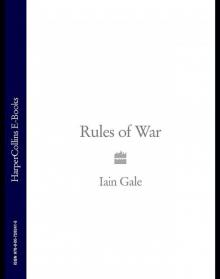 Rules of War
Rules of War